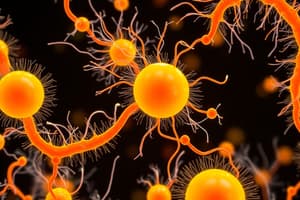Podcast
Questions and Answers
What is the central component of microbial respiration?
What is the central component of microbial respiration?
- Electron transport chain (correct)
- Proton gradient
- Photosynthesis
- ATP synthesis
How do microbes generate energy for their metabolic activities?
How do microbes generate energy for their metabolic activities?
- By converting light into ATP
- By releasing oxygen
- Through breaking down complex compounds like amino acids (correct)
- By producing complex sugars
What is the function of cytochromes in the electron transport chain?
What is the function of cytochromes in the electron transport chain?
- Transferring electrons between molecules (correct)
- Storing oxygen
- Generating light energy
- Breaking down organic molecules
What is the end product of breaking down complex compounds during microbial respiration?
What is the end product of breaking down complex compounds during microbial respiration?
What creates a proton gradient in the electron transport chain?
What creates a proton gradient in the electron transport chain?
How do protons release energy in the electron transport chain for ATP synthesis?
How do protons release energy in the electron transport chain for ATP synthesis?
What is the main function of the electron transport chain (ETC) described in the text?
What is the main function of the electron transport chain (ETC) described in the text?
In microbial respiration, what are some alternative electron acceptors mentioned in the text?
In microbial respiration, what are some alternative electron acceptors mentioned in the text?
How do bacteria produce ATP in the presence of oxygen as the final electron acceptor, according to the text?
How do bacteria produce ATP in the presence of oxygen as the final electron acceptor, according to the text?
What environmental factors mentioned in the text can influence microbial growth and survival?
What environmental factors mentioned in the text can influence microbial growth and survival?
Why is studying microbial respiration and the ETC considered crucial, as stated in the text?
Why is studying microbial respiration and the ETC considered crucial, as stated in the text?
Which process is thought to have driven the development of aerobic respiration in early eukaryotes?
Which process is thought to have driven the development of aerobic respiration in early eukaryotes?
Study Notes
Microorganisms, including bacteria, fungi, and protists, rely on respiration processes similar to those found in humans and other multicellular organisms. These processes allow them to convert energy stored in organic compounds into ATP, which powers their metabolic activities. In contrast to photosynthetic organisms, which generate energy through light, microbes depend on oxidizing organic molecules to produce ATP. This process involves breaking down complex compounds, such as amino acids, pyruvate, fatty acids, and sugars, to simpler end products like CO2, H2O, and NH3. This breakdown releases energy, which can be used by the cell's machinery to power various functions.
The central component of microbial respiration is the electron transport chain (ETC), also known as the proton motive force generator. This chain consists of a series of redox reactions involving membrane-bound proteins called cytochromes, each transferring electrons from one molecule to another while pumping protons across the inner mitochondrial membrane. This creates a proton gradient, with higher proton concentrations outside the membrane compared to inside it. When the protons flow back through specialized channels in the opposite direction, they release energy, which is used to produce ATP.
The overall process of microbial respiration can be summarized as follows:
- Organic molecules are broken down into simpler compounds, releasing energy.
- Electrons are transferred along the ETC, pumping protons across the membrane.
- The generated proton gradient is used to produce ATP.
The specific molecules involved in these reactions can vary among different species, depending on their available nutrients and enzymes. For example, some bacteria can use oxygen as the final electron acceptor, which allows them to produce ATP through the citric acid cycle and the ETC. Other microbes, such as those living in anaerobic environments, may rely on alternative electron acceptors like nitrate, sulfate, or iron(III) to drive their respiratory processes.
Studying the ETC and microbial respiration is crucial for understanding various aspects of microbial physiology and ecology. It also provides insights into the evolution of life on Earth, as these processes are thought to have driven the development of aerobic respiration in early eukaryotes, ultimately leading to the evolution of humans. Additionally, understanding microbial respiration can shed light on environmental factors that influence microbial growth and survival, such as oxygen availability, pH, and temperature.
In conclusion, microbial respiration plays a vital role in the energy metabolism of organisms as diverse as bacteria and protists. The electron transport chain is the central component of these processes, driving the conversion of energy stored in organic compounds into ATP that powers various cellular functions. Studying microbial respiration and the ETC can provide valuable insights into the physiology and ecology of microorganisms, as well as the evolution of life on Earth.
Studying That Suits You
Use AI to generate personalized quizzes and flashcards to suit your learning preferences.
Description
Test your knowledge on microbial respiration and the electron transport chain, processes essential for microorganisms to convert energy stored in organic compounds into ATP. Learn about the breakdown of complex molecules, electron transfer through membrane-bound proteins, and ATP production mechanisms.




